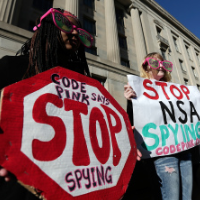Government Asks Judge to Toss NSA Surveillance Lawsuits
 Credit: Getty Images
Credit: Getty Images
By Tim Ryan, Courthouse News Service
WASHINGTON — Rhetoric heated up Friday in the courtroom of the judge who blocked the government’s bulk collection of cellphone metadata, as the government and a conservative activist argued over what to do with three cases against the National Security Agency (NSA) while awaiting an appeals court ruling.
The D.C. Circuit is currently considering whether the passage of the USA Freedom Act in June renders moot the injunction Judge Richard Leon issued against the National Security Agency’s bulk collection program in November, the second such injunction Leon has issued.
The same court reversed Leon’s original injunction in August, finding that conservative legal activist Larry Klayman had not proven the NSA had even collected his data.
The USA Freedom Act modified several provisions of the Patriot Act and purported to end the NSA’s bulk collection of metadata, though this is disputed by Klayman, who currently has three cases against the NSA and other government agencies pending in Leon’s court.
The cases still pending before Leon include the one that spawned the injunction currently being appealed, a second concerning the collection of internet data under a related program, and a class action suit alleging similar violations to the second case.
Klayman pleaded with Leon during Friday afternoon’s hearing to allow all three of his pending cases to go forward and proposed consolidating the first two in order to get the cases decided as soon as possible, arguing they have been on hold for too long.
“In order to move forward, I don't think we can wait another two-and-a-half years for the D.C. Circuit to rule,” Klayman said. “We might all be dead by then.”
Leon was largely silent Friday, a departure from previous hearings where he frequently interrupted lawyers to ask questions and make points. Klayman used this silence to emphasize the importance of the cases before Leon, calling the judge “patriotic” for blocking the collection program and saying he was the only member of the court system willing to stand up to the program.
At one point, Klayman alleged the D.C. Circuit was acting as a separate arm of the executive branch, seeking to uphold the NSA program regardless of its constitutionality.
Klayman asked Leon to open discovery on the first two cases after consolidating them, and invited Leon to have a conversation in his chambers with a CIA whistleblower if he still had doubts about the severity of the collection programs.
“We can’t have this going on in a civilized society,” Klayman told the judge.
The government’s claims at the hearing were far less moralistic, instead claiming Klayman’s cases have major issues the lawyer has overlooked.
Regardless of how the D.C. Circuit comes down on Leon’s injunction, Klayman has not addressed how he could collect damages from the federal government under his lawsuit, as he has not proposed a sovereign immunities waiver, argued Rodney Patton, who represented the government.
“There simply are no viable damages claims at all,” Patton said.
Patton also claimed Klayman’s second complaint has no merit because the bulk metadata program it challenges was authorized under federal law and was not the same as the cellphone collection program.
Finally, Patton said Klayman’s class action suit was essentially identical to the internet case and is an example of claim-splitting, which should invalidate the case.
In a separate issue, Klayman has not properly served the individuals he named in the cases, said James Whitman, who represents, in their individual capacities, President Barack Obama, Attorney General Eric Holder and Roger Vinson, the federal judge who authorized the Verizon warrant to collect metadata.
After Whitman sat down, Klayman came to the lectern again, incensed.
“They have a million reasons why this can’t go forward and none of them are valid,” Klayman said.
He alleged the government was playing a “shell game” with the USA Freedom Act and the internet program, and pushed back against the claim that he had not properly served the individual defendants, wondering if he had to jump the White House fence to serve Obama.
Klayman also pushed aside the sovereign immunity issue.
“They don’t have sovereign immunity to violate the Constitution,” he said.
Leon gave little indication at the hearing of what he intends to do with the pending cases, but did tell Whitman he would rule “as soon as possible” on his request to dismiss the allegedly improperly served individual defendants.
To Learn More:
3 Republican-Appointed Federal Appeals Judges Overturn Blocking of NSA Mass Telephone Spying (by Steve Straehley, AllGov)
Judge Pulls Plug on NSA Mass Phone Data Collection, Even as Program Shifts Gears (by Noel Brinkerhoff, AllGov)
“Orwellian” NSA Phone Spying Probably Unconstitutional, Rules Outraged Federal Judge (by Danny Biederman and Noel Brinkerhoff, AllGov)
- Top Stories
- Unusual News
- Where is the Money Going?
- Controversies
- U.S. and the World
- Appointments and Resignations
- Latest News
- Trump to Stop Deportations If…
- Trump Denounces World Series
- What If China Invaded the United States?
- Donald Trump Has a Mental Health Problem and It Has a Name
- Trump Goes on Renaming Frenzy






Comments